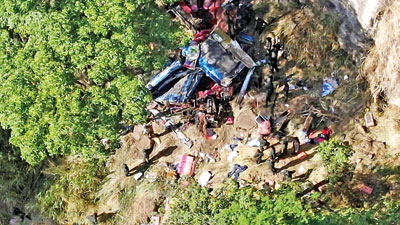The recent bus accident on the Ella–Wellawaya main road has sparked national outrage—not only for the tragic loss of 15 lives, but also for the troubling questions it raises about accountability and the discretionary use of public funds.
Proven Driver Negligence
According to the technical examination conducted after the crash, the fault lies squarely with the driver. The bus was descending a steep slope in fourth gear—a reckless choice that reflects either gross negligence or a lack of basic training. In such terrain, lower gears are essential to control speed and reduce reliance on brakes. Operating in fourth gear suggests the driver either ignored safety protocols or was unaware of them altogether.
Further compounding the issue, the bus owner was arrested and presented to court for failing to maintain the vehicle. This was not a state-run service—it was a privately organized trip. Yet, despite clear evidence of negligence and private ownership, the government has stepped in with public compensation.
Presidential Fund: Misuse or Mercy?
The President’s Fund has granted Rs. 1 million to the families of each deceased victim. While this gesture may appear compassionate, it raises serious legal and ethical concerns:
- No statutory basis exists for compensating victims of privately organized trips through the President’s Fund.
- If the driver had survived, he could have faced charges of culpable homicide or even murder, given the deliberate choice to drive in fourth gear despite faulty brakes.
- Ironically, the driver’s family is also eligible for the same compensation—despite his central role in the tragedy.
This sets a dangerous precedent: rewarding negligence with public money. If the Presidential Fund is used to compensate victims of accidents, then shouldn’t all road fatalities—regardless of context—be treated equally under the law?
Equal Justice or Political Discretion?
Among the deceased was the Secretary of the Tangalle Urban Council, who had been granted leave for the trip. His death, while tragic, occurred during a personal excursion—not in the line of duty. Yet, he too qualifies for the Rs. 1 million payout.
This raises a broader question: What qualifies someone for state-funded compensation? Is it public service, innocence, or simply political discretion?
Minister Nalin Jayatissa recently criticized the misuse of the Presidential Fund, referencing past allocations to celebrities like Malani Fonseka. The Ella tragedy echoes that concern. There is no clause in the President’s budget that authorizes compensation for deaths caused by personal negligence or private travel. Yet, both President Ranil Wickremesinghe and former President Anura Kumara Dissanayake have exercised this discretion liberally.
The Principle of Clean Hands
Justice must be blind—not biased by emotion, politics, or public pressure. If compensation is to be standardized, it must be codified in law. Otherwise, it risks becoming a tool of political favoritism or populist appeasement.
The Ella tragedy is not just a story of lives lost—it’s a test of our legal and moral compass. If we truly believe in equal justice, then we must demand transparency, accountability, and consistency in how public funds are used.
